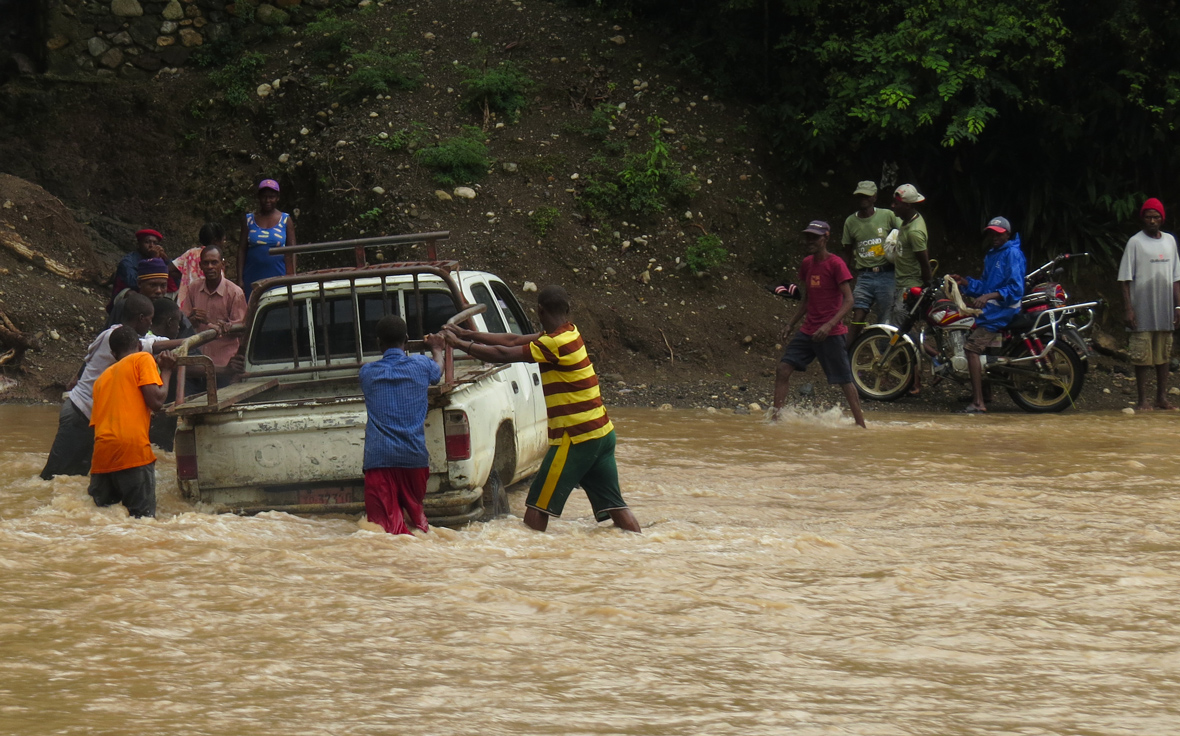By Bev Ducak
When I reflect on our mission trip to Gambade along the Grand Riviere du Nord near Cap Haitien, my thoughts return to the delivery room at the local public hospital …the metal chair with stirrups was not unlike others, but the ripped and dirty foam covering the chair is an unforgettable image.
This image could be representative of the glaring medical needs in this community; I’m certain this is not unlike other communities. I realized, as I saw degrees of stark need in the medical facilities, I also saw this emptiness in young and older men’s eyes as they idly sat staring, waiting to pass the time. The children still had some hope and smiles in their eyes–ones that were not too affected by dehydration and/or protein calorie malnutrition.
What else did I see you ask? I saw beauty in their eyes and smiles; gratitude, hope as evidenced at the site of the Gambade clinic under construction. The village people came with curiosity, hope, and, needs. They broke out in song in Creole with “How Great Thou Art” while tears streamed down our faces as we tried to sing with them.
Word spread mouth to mouth, dwelling to dwelling that we would be doing clinics with doctors and nurses and medicines. Hundreds of folks came, many traveling for hours in the early morning from the mountains in this Northern region. Put this into context of muddy roads, rain, and floods. That is my little snapshot.

Flooding in Haiti, 2016
This venture had a spiritual and personal impact on me. It challenged some of my paradigms on missions and on poverty. Many of us give graciously toward relief efforts after a crisis. While this is essential and demonstrates goodwill, we have to be mindful of helping those in need participate in their own recovery once immediate relief needs are addressed. We need to validate the individual’s worthiness. We need not to create dependence nor undermine the person’s capacity to steward what little resources they may have. We must be aware of our motives, our “god-complexes”.
We invested our time and souls into team-building and growing in the Word. We were challenged during our devotionals to “Do no harm, Do good, and love God”.
Listening and Learning were key on this trip. They are the main concepts in mission work, especially short-term missions.
Some of the main concepts I gleaned and embraced are from the text “When Helping Hurts: How to Alleviate Poverty”, S. Corbett & B. Fikkert.
- Poverty – feeling of powerlessness; poverty of being.
- Poverty alleviation efforts need to address both the broken systems and broken individuals.
- Poverty Alleviation: is the ministry of reconciliation – moving people closer to glorifying God by living in right relationship with God, with self, with others, and, with the rest of creation. This occurs when the power of Christ’s resurrection reconciles our key relationships through the transformation of both individual lives and local, national and international systems.
To put this in a contextual framework, consider these three events and how they relate to the above concepts:
- Creation
- The Fall
- Redemption
People glorify God by working and supporting themselves and their families with the fruit of their work. It is empowering. Work is an act of worship.
Our goal with short-term missions is that they will become long term sustainable projects, working along with the people, the nationals to help foster their independence and talents and resources toward economic development and sustainability.
We are to share His Glory, His love, His works to all nations. Let our light (His love) shine, not on us but toward Him. (Psalm 96:3, my paraphrase)
 Photo: Bev in Haiti, 2016.
Photo: Bev in Haiti, 2016.
DONATIONS
Donations for the EMAS Medical Team or Construction project:
• $50 helps with the cost of medical supplies
• $75 defrays costs of Medical equipment or Training of local staff
• $100 helps with the cost of completing construction and buying non-medical equipment.
For more information visit: Gambade Haiti Team

